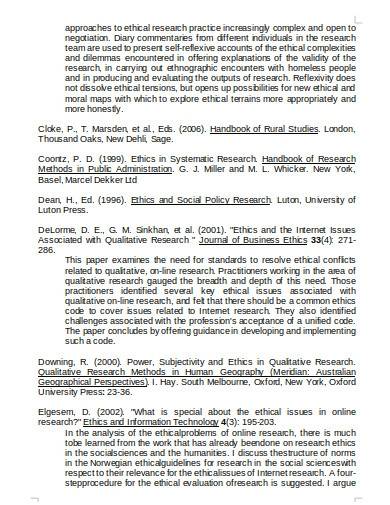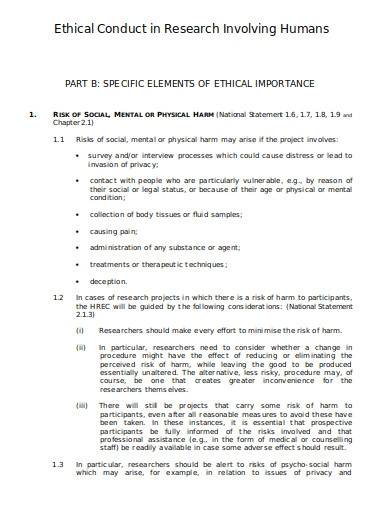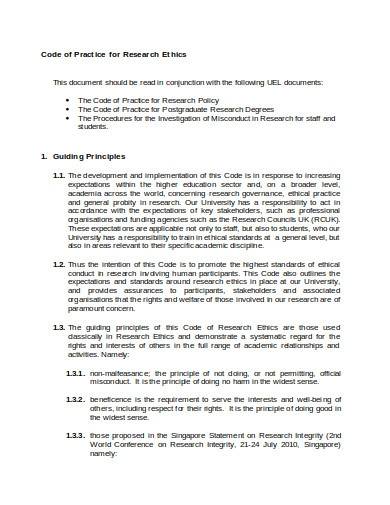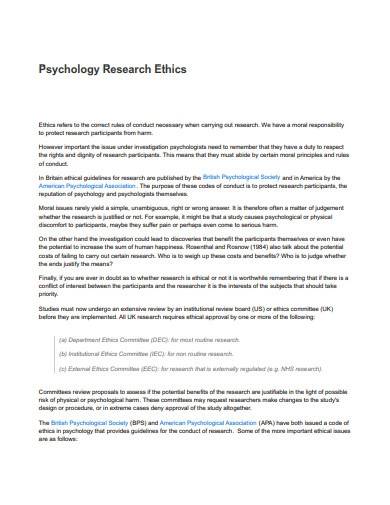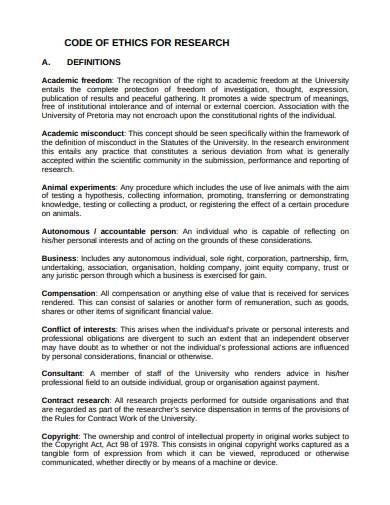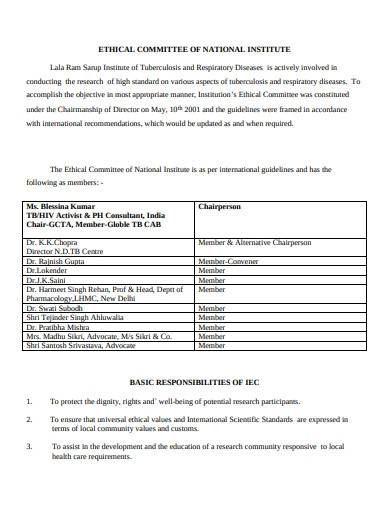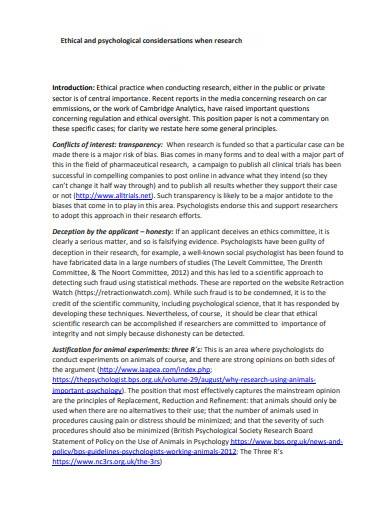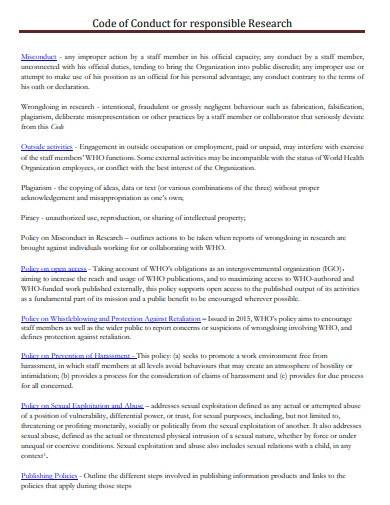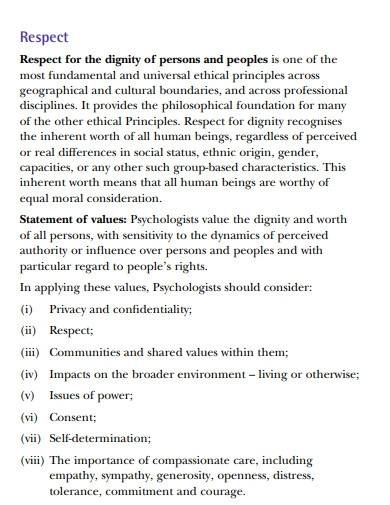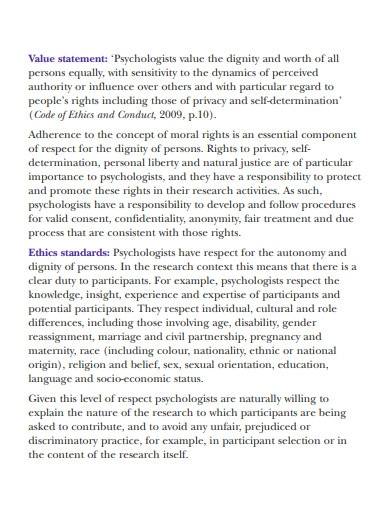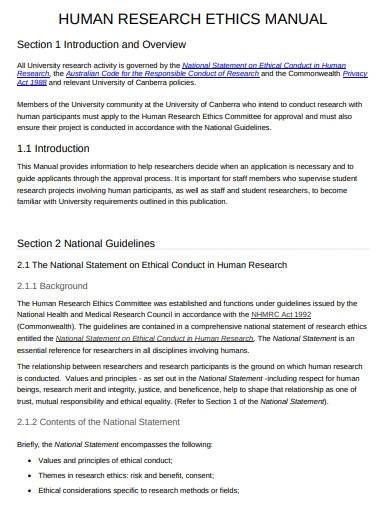The Code of Human Research Ethics is built on three basic principles: respect for persons, beneficence, and justice. Respect for persons means that individuals should be treated as autonomous agents and given the opportunity to make informed decisions about their participation agreement in descriptive research. Beneficence means that research should do no harm to participants and that the benefits of research should outweigh any potential risks assessment. Justice means that the benefits and burdens of research should be fairly distributed among participants.
FREE 10+ Code of Human Research Ethics Samples & Templates
1. Code of Human Research Ethics Template
2. Ethical Conduct in Research Humans
3. Code of Practice for Research Ethics
4. Sample Psychology Research Ethics
5. Code of Ethics for Research Template
6. Official Code of Human Research Ethics
7. Psychological Code of Human Research Ethical
8. Code of Conduct for Responsible Research
9. Simple Code of Human Research Ethical
10. Code of Human Research Ethics Statement
11. Human Research Ethics Manual
What is Code of Human Research Ethics?
The Code of Human Research Ethics is a set of guidelines that aim to ensure the ethical conduct of research involving human subjects. These guidelines are designed to protect the rights and welfare of participants, ensure that research is conducted in a responsible manner, and maintain public trust in the scientific community.
How To Make Code of Human Research Ethics?
One of the most important requirements of the Code of Human Research Ethics is informed consent. Informed consent means that participants must be provided with all the information they need to make an informed decision about whether to participate in the study. Developing a Code of Human Research Ethics requires a thorough understanding of the ethical principles that underpin research involving human subjects. Here are some steps that can guide the process of creating a Code of Human Research Ethics:
Step 1- Identify Ethical Principles
Begin by identifying the fundamental ethical principles that should guide research involving human subjects. These may include respect for persons, beneficence, and justice, among others. Conduct a thorough literature review to identify existing guidelines and codes of ethics related to action research involving human subjects. This can include guidelines from regulatory bodies, professional associations, and academic institutions.
Step 2- Consult with Stakeholders
Consult with a range of stakeholders to gather input on the development of the Code of Human Research Ethics. This can include researchers, research participants, institutional review boards, ethics committees, and regulatory bodies. Based on the ethical principles and input from stakeholders, develop specific guidelines for research involving human subjects. These guidelines should cover areas such as informed consent, research confidentiality agreement and privacy policy, risk assessment and management, participant selection, and the dissemination of research findings.
Step 3- Obtain Feedback
Seek feedback samples from stakeholders on the draft Code of Human Research Ethics. This feedback can be used to refine and improve the guidelines. Once the Code of Human Research Ethics has been finalized, it should be implemented across all research projects involving human subjects. This can include training researchers and other personnel on the guidelines and ensuring that all research project proposal undergo ethical review and approval.
Step 4- Review and Update
Regularly review and update the Code of Human Research Ethics to ensure that it remains up-to-date with evolving ethical issues and practices.
Who is responsible for ensuring compliance with the Code of Human Research Ethics?
Researchers, research institutions, and regulatory bodies are all responsible for ensuring compliance with the Code of Human Research Ethics. Researchers are responsible for conducting research in an ethical and responsible manner, institutions are responsible for ensuring that ethical guidelines are followed, and regulatory bodies are responsible for enforcing ethical standards and guidelines.
What happens if the Code of Human Research Ethics is violated?
If the Code of Human Research Ethics is violated, there can be serious consequences for the researchers, institutions, and regulatory bodies involved. This can include fines, sanctions, and even criminal charges, depending on the nature and severity of the violation.
How often is the Code of Human Research Ethics updated?
The Code of Human Research Ethics is updated regularly to ensure that it remains up-to-date with evolving ethical issues and practices. The frequency of updates can vary depending on the institution or regulatory body involved, but it is typically reviewed and updated every few years.
In conclusion, the Code of Human Research Ethics is a set of guidelines designed to ensure the ethical conduct of research involving human subjects. It is built on the principles of respect for persons, beneficence, and justice and requires that researchers obtain informed consent, protect confidentiality and privacy, minimize risks, and distribute benefits fairly. These guidelines are essential for maintaining public trust in the scientific community and for ensuring that research contributes to the betterment of society.
Related Posts
FREE 10+ Content Validity Samples & Templates in PDF
FREE 10+ Construct Validity Samples & Templates in MS Word | PDF
FREE 10+ Biography Research Report Samples and Templates in PDF
FREE 10+ System Documentation Samples & Templates in MS Word | PDF
FREE 10+ Process Document Samples & Templates in MS Word | PDF
FREE 10+ Action Research Samples & Templates in PDF
FREE 10+ Longitudinal Research Samples & Templates in PDF | MS Word
FREE 10+ Causal Research Samples & Templates in MS Word | PDF
FREE 10+ Client Discovery Samples & Templates in MS Word | PDF
FREE 10+ Null Hypothesis Samples & Templates in MS Word | PDF
FREE 9+ Product Knowledge Samples & Templates in PDF
FREE 10+ Software Documentation Samples & Templates in MS Word | PDF
FREE 10+ Exploratory Research Samples & Templates in PDF | MS Word
FREE 10+ Experimental Research Samples & Templates in MS Word | PDF
FREE 10+ Descriptive Research Samples & Templates in PDF

